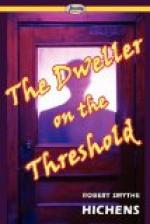“But are there such cases? Of double transfer, I mean?”
“Personally I have never verified one. When you spoke of the reverend gentlemen for the first time, I said, ‘Study the link!’ There will be development in the link if—all the rest of it.”
“There has been development, as I told you. The link is on his side now.”
“That’s remarkable, undoubtedly. Has it ever struck you that Harding was almost too successful a clergyman to be a genuinely holy man?”
“What do you mean?”
“There’s a modesty in holiness that is hardly adapted to catch smart women.”
“You used to go to hear Harding preach.”
“And d’you know why I liked his sermons?”
“Why?”
“Because he understood doubt so well. That amused me. But the man who has such a comprehensive understanding of skepticism, is very seldom a true believer. One thing, though, Harding certainly does believe in, judging by a sermon I once heard him preach.”
“And that is?”
“Manicheism. Chichester, you say, was a saint?”
“He was, if a man can be a saint who has a certain amiable weakness of character.”
“And now? You think he would be a difficult customer to tackle now?”
“Harding finds him so.”
“And Harding was an overwhelming chap, cocksure of himself. Chichester must be difficult. Shall I tackle him?”
“I wish you would. But how? Do you wish me to introduce him to you?”
“Let me see.”
The professor dropped his head and remained silent for a minute or two.
“Tell me something,” he at length remarked, lifting his head and assuming his most terrier-like aspect. “Do you think Harding a whited sepulcher?”
“Possibly.”
“And do you think his saintly curate has found it out?”
“Do you think that would supply a natural explanation of the mystery?”
“Should you prefer to search for it in that malefic region which is the abiding-place of nervous dyspepsia?”
“How could—”
“Acute nervous dyspepsia, complicated by a series of sittings under the rose, might eat away the most brazen self-confidence. That’s as certain as that I wear whiskers and you don’t. Shall we do an addition sum? Shall we add Chichester’s discovery of secret lapses in his worshiped rector’s life, to the nervous dyspepsia and the sittings? Shall we do that?”
“And Lady Sophia?”
“There’s a sunflower type of woman. The rising sun can’t escape her inevitable worship.”
“The change in Harding may be a natural one. But there is something portentous in the change in Chichester,” said Malling. “You know I’m a rather cool hand, and certainly not inclined to easy credulity. But there’s something about Chichester which—well, Professor, I’ll make a confession to you that isn’t a pleasant one for any man to make. There’s something about Chichester which shakes my nerves.”




